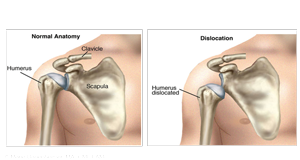Shoulder Dislocation
A Shoulder Dislocation is an injury in which the upper arm bone pops out of the cup-shaped socket that’s part of the shoulder blade. The shoulder is the body’s most flexible joint, which makes it more likely to dislocate. If you suspect a dislocated shoulder, seek prompt medical attention.
If you suspect a dislocated shoulder, seek prompt medical attention. Most people regain full use of their shoulder within a few weeks. However, once a shoulder dislocates, the joint might be prone to repeat dislocations.

Dislocated shoulder symptoms can include:
- A visibly deformed or out-of-place shoulder
- Swelling or bruising
- Intense pain
- Inability to move the joint
Shoulder dislocation can also cause numbness, weakness or tingling near the injury, such as in the neck or down the arm. The muscles in the shoulder might spasm, which can increase the pain.
Causes of Shoulder Dislocation include:
- Sports injuries. Shoulder dislocation is a common injury in contact sports, such as football and hockey. It’s also common in sports that might involve falls, such as downhill skiing, gymnastics and volleyball.
- Trauma not related to sports. A hard blow to the shoulder during a motor vehicle accident can cause dislocation.
- Falls. Landing awkwardly after a fall, such as from a ladder or from tripping on a loose rug, can dislocate a shoulder.
Diagnosis
Orthopedic Specialist at Shreya Hospital in Ghaziaban inspects the affected area for tenderness, swelling or deformity and checks for signs of nerve or blood vessel injury. They might ask for tests if required include:
- Electromyography (EMG)
- MRI
- X-ray
Treatment of Shoulder Dislocation
Dislocated shoulder treatment might involve:
- Closed reduction. In this procedure, some gentle maneuvers might help move the shoulder bones back into position. Depending on the amount of pain and swelling, a muscle relaxant or sedative or, rarely, a general anesthetic might be given before moving the shoulder bones. When the shoulder bones are back in place, severe pain should improve almost immediately.
- Surgery. Surgery might help those with weak shoulder joints or ligaments who have repeated shoulder dislocations despite strengthening and rehabilitation. In rare cases, damaged nerves or blood vessels might require surgery. Surgical treatment might also reduce the risk of re-injury in young athletes.
- Immobilization. After closed reduction, wearing a special splint or sling for a few weeks can keep the shoulder from moving while it heals.
- Medication. A pain reliever or a muscle relaxant might provide comfort while the shoulder heals.
- Rehabilitation. When the splint or sling is no longer needed, a rehabilitation program can help restore range of motion, strength and stability to the shoulder joint.
A fairly simple shoulder dislocation without major nerve or tissue damage likely will improve over a few weeks. Having full range of motion without pain and regained strength are necessary before returning to regular activities. Resuming activity too soon after shoulder dislocation may cause re-injury of the shoulder joint.
 Dr. Mishra’s Shahdara Orthopaedic Center Shahdara Orthopaedic Center, Best Orthopaedic Doctor in Shahdara, Delhi
Dr. Mishra’s Shahdara Orthopaedic Center Shahdara Orthopaedic Center, Best Orthopaedic Doctor in Shahdara, Delhi
